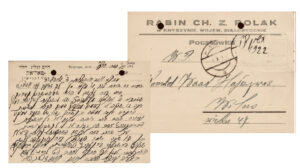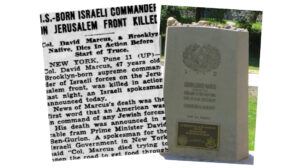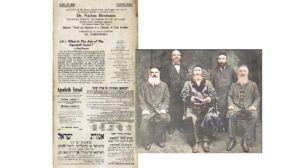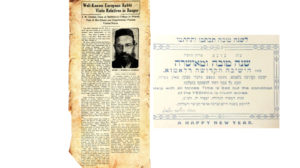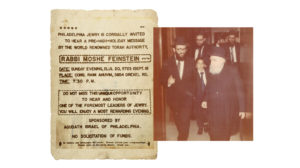Holy Company


(Photos: Avital Reichner archives)
Too late, the Jewish soldiers realized their mistake. The tanks roaring toward them in the dark were not in fact friendly forces, but rather their enemy. These were not Israeli reinforcements coming to rescue them, but Egyptians coming to cut them off, surround them, and kill them.
It was December 28, 1948 — the second night of Chanukah. As the tanks encircled them and shells began pounding them, they probably realized they had failed in their mission — failed to take the hill, to conquer the Fallujah Pocket, and to liquidate this Arab brigade that had plagued the fledgling State of Israel for months. But perhaps the last thought to cross the minds of these soldiers — who were nearly all frum — was that it was a far better thing to die here, defending Jewish lives on admas kodesh, than on the blood-soaked soil of Europe, which these soldiers had escaped only months before.
Yissachar Dov Friedman, a Chabad chassid, was among the 89 who fell that night. He was the only surviving member of his family, having come from Auschwitz to the shores of Eretz Yisrael, and settling, together with other chassidim, in Tel Aviv. When Arab armies attacked on May 15, 1948, Friedman was recruited to the motley Israeli army and sent to defend the borders of the newly declared Jewish state.
Friedman joined a contingent of religious soldiers that came to be known as Plugat Ha’Elokim, the “Company of G-d,” part of the Alexandroni Brigade. Many of his comrades were lone Holocaust survivors like him, who had hardly set foot on the holy soil of Eretz Yisrael when they were sent into combat. They conducted their army service the same way they observed mitzvos — with uncompromising mesirus nefesh.
The monument erected in their memory stands in a park at the edge of Kiryat Gat — at the very place where they fought and died — in peaceful surroundings that testify to their kiddush Hashem.
Forgotten Fallen
Aside from the war memorial, for decades there was scant testimony to this little-known chapter in Israel’s War of Independence. That changed two years ago when Mrs. Avital Reichner, a young religious teacher from Lod, decided to prepare a documentary to commemorate Plugat Ha’Elokim. She had a personal stake in bringing this story to light.
“Yissachar Dov Friedman was my great-grandmother’s cousin,” she says. “When I was 12, I had to prepare a school assignment on my family roots. My cousins had already written about our grandparents, and I wanted something different. When I heard a little of [Yissachar Dov’s] history, I was surprised that I’d never heard of his company before, and I was sure that most people were likewise unaware of their story.”
Mrs. Reichner’s assignment progressed slowly, as precise details were hard to come by, but the more she investigated, the greater her conviction grew that she could not allow this saga to be forgotten. In the course of her research, Mrs. Reichner discovered that her husband, Rabbi Yoel Reichner, also had a connection to the religious company: his grandfather, Rabbi Shmuel Gelbard, had a chavrusa, Rabbi Shimon Ashkenazy, who belonged to the same company, and had fallen in the same battle.
“Saba told us that Shimon constantly dreamed of returning to Yeshivas Chevron in Geula and continuing his learning, but sadly, he never did,” Rav Reichner related.
(Excerpted from Mishpacha, Issue 739)
Oops! We could not locate your form.

